Co-Ownership and Conveyancing Issues
VerifiedAdded on 2020/01/23
|8
|2385
|127
Case Study
AI Summary
This assignment delves into the intricacies of co-ownership and conveyancing in a real estate scenario. It presents a case involving multiple owners and explores legal issues surrounding their rights and obligations under the Trusts of Land and Appointment of Trustees Act 1996 (TOLATA). The analysis covers aspects like joint tenancy, severance, sale procedures, and potential claims from individuals not formally part of the ownership agreement. Students are tasked with analyzing the legal implications for a prospective buyer interested in purchasing the property.
Contribute Materials
Your contribution can guide someone’s learning journey. Share your
documents today.
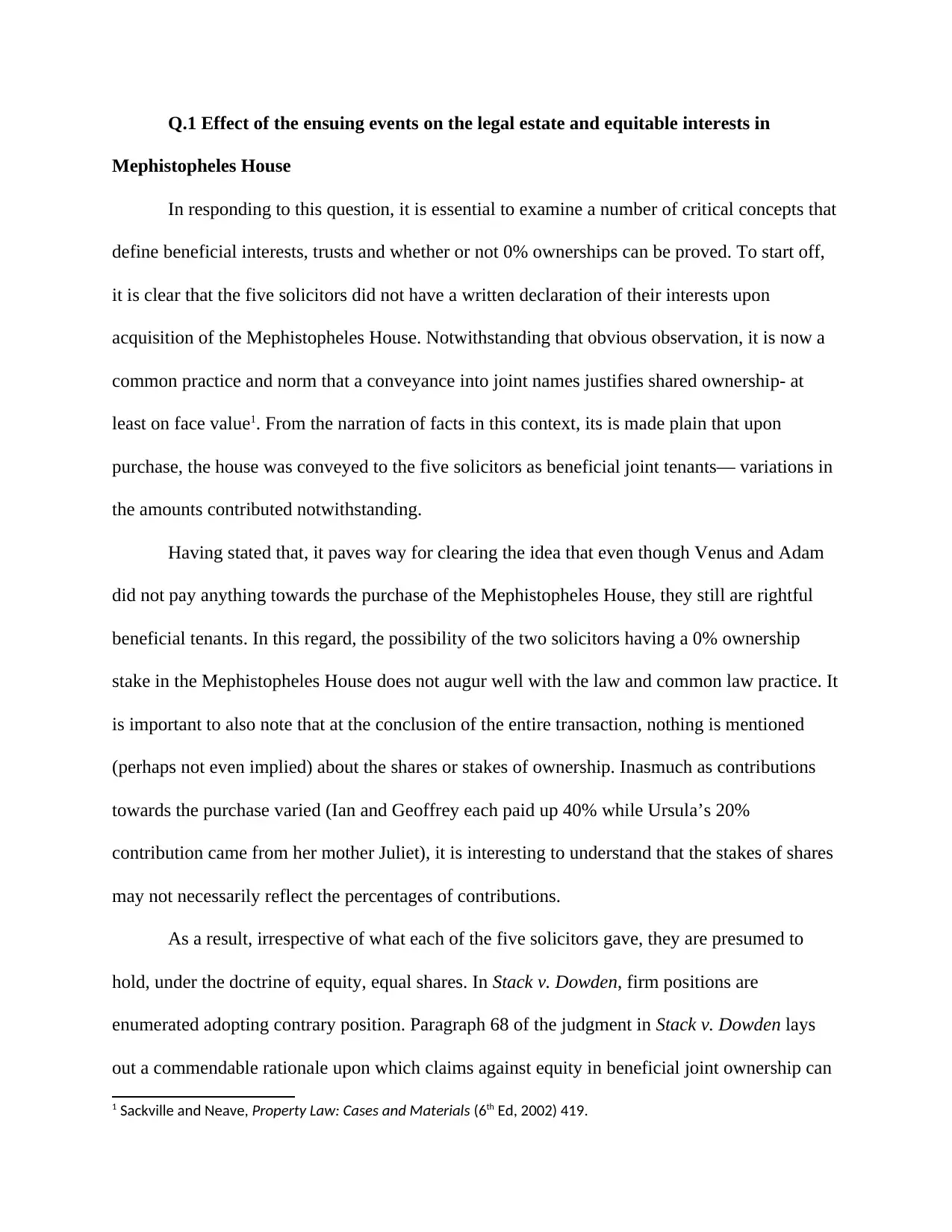
Q.1 Effect of the ensuing events on the legal estate and equitable interests in
Mephistopheles House
In responding to this question, it is essential to examine a number of critical concepts that
define beneficial interests, trusts and whether or not 0% ownerships can be proved. To start off,
it is clear that the five solicitors did not have a written declaration of their interests upon
acquisition of the Mephistopheles House. Notwithstanding that obvious observation, it is now a
common practice and norm that a conveyance into joint names justifies shared ownership- at
least on face value1. From the narration of facts in this context, its is made plain that upon
purchase, the house was conveyed to the five solicitors as beneficial joint tenants— variations in
the amounts contributed notwithstanding.
Having stated that, it paves way for clearing the idea that even though Venus and Adam
did not pay anything towards the purchase of the Mephistopheles House, they still are rightful
beneficial tenants. In this regard, the possibility of the two solicitors having a 0% ownership
stake in the Mephistopheles House does not augur well with the law and common law practice. It
is important to also note that at the conclusion of the entire transaction, nothing is mentioned
(perhaps not even implied) about the shares or stakes of ownership. Inasmuch as contributions
towards the purchase varied (Ian and Geoffrey each paid up 40% while Ursula’s 20%
contribution came from her mother Juliet), it is interesting to understand that the stakes of shares
may not necessarily reflect the percentages of contributions.
As a result, irrespective of what each of the five solicitors gave, they are presumed to
hold, under the doctrine of equity, equal shares. In Stack v. Dowden, firm positions are
enumerated adopting contrary position. Paragraph 68 of the judgment in Stack v. Dowden lays
out a commendable rationale upon which claims against equity in beneficial joint ownership can
1 Sackville and Neave, Property Law: Cases and Materials (6th Ed, 2002) 419.
Mephistopheles House
In responding to this question, it is essential to examine a number of critical concepts that
define beneficial interests, trusts and whether or not 0% ownerships can be proved. To start off,
it is clear that the five solicitors did not have a written declaration of their interests upon
acquisition of the Mephistopheles House. Notwithstanding that obvious observation, it is now a
common practice and norm that a conveyance into joint names justifies shared ownership- at
least on face value1. From the narration of facts in this context, its is made plain that upon
purchase, the house was conveyed to the five solicitors as beneficial joint tenants— variations in
the amounts contributed notwithstanding.
Having stated that, it paves way for clearing the idea that even though Venus and Adam
did not pay anything towards the purchase of the Mephistopheles House, they still are rightful
beneficial tenants. In this regard, the possibility of the two solicitors having a 0% ownership
stake in the Mephistopheles House does not augur well with the law and common law practice. It
is important to also note that at the conclusion of the entire transaction, nothing is mentioned
(perhaps not even implied) about the shares or stakes of ownership. Inasmuch as contributions
towards the purchase varied (Ian and Geoffrey each paid up 40% while Ursula’s 20%
contribution came from her mother Juliet), it is interesting to understand that the stakes of shares
may not necessarily reflect the percentages of contributions.
As a result, irrespective of what each of the five solicitors gave, they are presumed to
hold, under the doctrine of equity, equal shares. In Stack v. Dowden, firm positions are
enumerated adopting contrary position. Paragraph 68 of the judgment in Stack v. Dowden lays
out a commendable rationale upon which claims against equity in beneficial joint ownership can
1 Sackville and Neave, Property Law: Cases and Materials (6th Ed, 2002) 419.
Secure Best Marks with AI Grader
Need help grading? Try our AI Grader for instant feedback on your assignments.
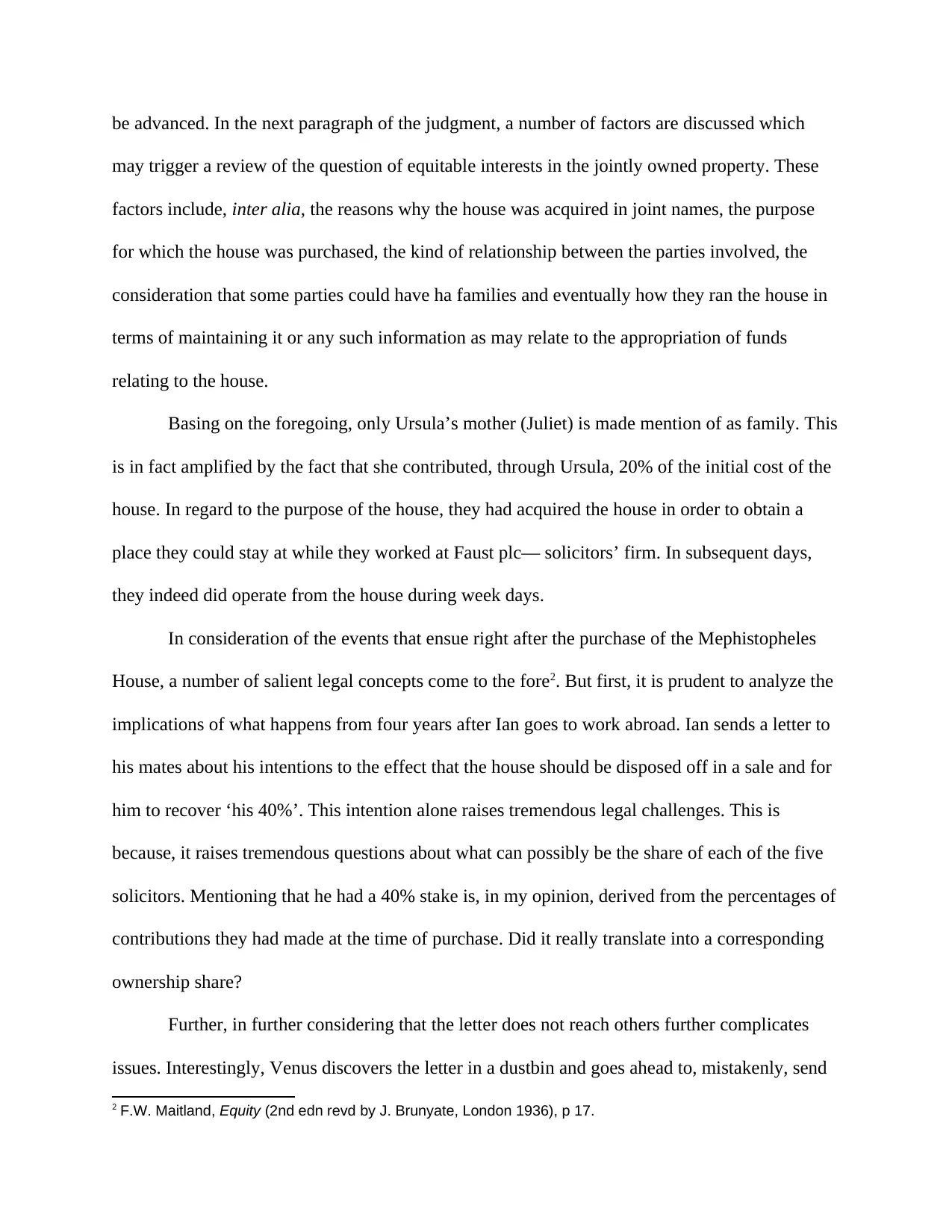
be advanced. In the next paragraph of the judgment, a number of factors are discussed which
may trigger a review of the question of equitable interests in the jointly owned property. These
factors include, inter alia, the reasons why the house was acquired in joint names, the purpose
for which the house was purchased, the kind of relationship between the parties involved, the
consideration that some parties could have ha families and eventually how they ran the house in
terms of maintaining it or any such information as may relate to the appropriation of funds
relating to the house.
Basing on the foregoing, only Ursula’s mother (Juliet) is made mention of as family. This
is in fact amplified by the fact that she contributed, through Ursula, 20% of the initial cost of the
house. In regard to the purpose of the house, they had acquired the house in order to obtain a
place they could stay at while they worked at Faust plc— solicitors’ firm. In subsequent days,
they indeed did operate from the house during week days.
In consideration of the events that ensue right after the purchase of the Mephistopheles
House, a number of salient legal concepts come to the fore2. But first, it is prudent to analyze the
implications of what happens from four years after Ian goes to work abroad. Ian sends a letter to
his mates about his intentions to the effect that the house should be disposed off in a sale and for
him to recover ‘his 40%’. This intention alone raises tremendous legal challenges. This is
because, it raises tremendous questions about what can possibly be the share of each of the five
solicitors. Mentioning that he had a 40% stake is, in my opinion, derived from the percentages of
contributions they had made at the time of purchase. Did it really translate into a corresponding
ownership share?
Further, in further considering that the letter does not reach others further complicates
issues. Interestingly, Venus discovers the letter in a dustbin and goes ahead to, mistakenly, send
2 F.W. Maitland, Equity (2nd edn revd by J. Brunyate, London 1936), p 17.
may trigger a review of the question of equitable interests in the jointly owned property. These
factors include, inter alia, the reasons why the house was acquired in joint names, the purpose
for which the house was purchased, the kind of relationship between the parties involved, the
consideration that some parties could have ha families and eventually how they ran the house in
terms of maintaining it or any such information as may relate to the appropriation of funds
relating to the house.
Basing on the foregoing, only Ursula’s mother (Juliet) is made mention of as family. This
is in fact amplified by the fact that she contributed, through Ursula, 20% of the initial cost of the
house. In regard to the purpose of the house, they had acquired the house in order to obtain a
place they could stay at while they worked at Faust plc— solicitors’ firm. In subsequent days,
they indeed did operate from the house during week days.
In consideration of the events that ensue right after the purchase of the Mephistopheles
House, a number of salient legal concepts come to the fore2. But first, it is prudent to analyze the
implications of what happens from four years after Ian goes to work abroad. Ian sends a letter to
his mates about his intentions to the effect that the house should be disposed off in a sale and for
him to recover ‘his 40%’. This intention alone raises tremendous legal challenges. This is
because, it raises tremendous questions about what can possibly be the share of each of the five
solicitors. Mentioning that he had a 40% stake is, in my opinion, derived from the percentages of
contributions they had made at the time of purchase. Did it really translate into a corresponding
ownership share?
Further, in further considering that the letter does not reach others further complicates
issues. Interestingly, Venus discovers the letter in a dustbin and goes ahead to, mistakenly, send
2 F.W. Maitland, Equity (2nd edn revd by J. Brunyate, London 1936), p 17.
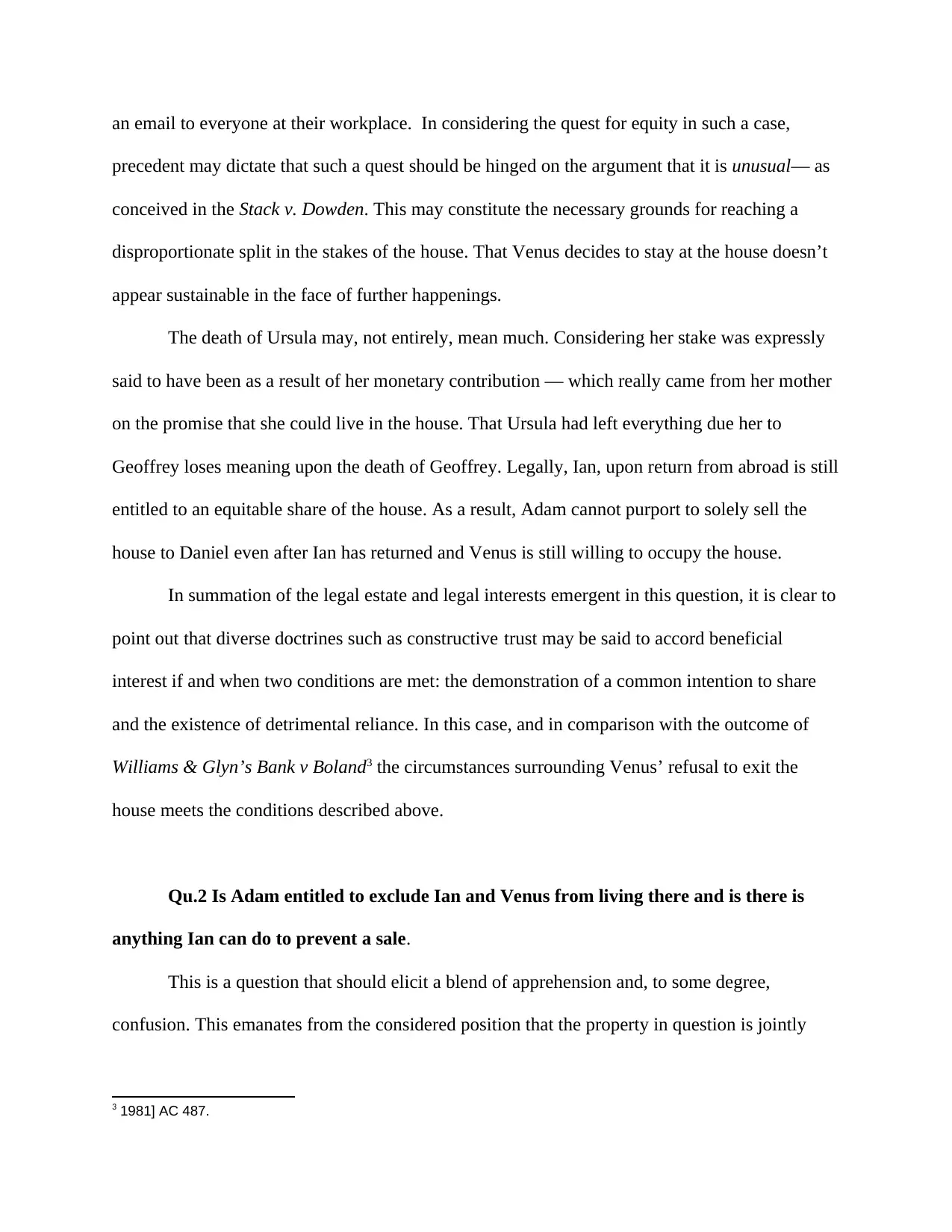
an email to everyone at their workplace. In considering the quest for equity in such a case,
precedent may dictate that such a quest should be hinged on the argument that it is unusual— as
conceived in the Stack v. Dowden. This may constitute the necessary grounds for reaching a
disproportionate split in the stakes of the house. That Venus decides to stay at the house doesn’t
appear sustainable in the face of further happenings.
The death of Ursula may, not entirely, mean much. Considering her stake was expressly
said to have been as a result of her monetary contribution — which really came from her mother
on the promise that she could live in the house. That Ursula had left everything due her to
Geoffrey loses meaning upon the death of Geoffrey. Legally, Ian, upon return from abroad is still
entitled to an equitable share of the house. As a result, Adam cannot purport to solely sell the
house to Daniel even after Ian has returned and Venus is still willing to occupy the house.
In summation of the legal estate and legal interests emergent in this question, it is clear to
point out that diverse doctrines such as constructive trust may be said to accord beneficial
interest if and when two conditions are met: the demonstration of a common intention to share
and the existence of detrimental reliance. In this case, and in comparison with the outcome of
Williams & Glyn’s Bank v Boland3 the circumstances surrounding Venus’ refusal to exit the
house meets the conditions described above.
Qu.2 Is Adam entitled to exclude Ian and Venus from living there and is there is
anything Ian can do to prevent a sale.
This is a question that should elicit a blend of apprehension and, to some degree,
confusion. This emanates from the considered position that the property in question is jointly
3 1981] AC 487.
precedent may dictate that such a quest should be hinged on the argument that it is unusual— as
conceived in the Stack v. Dowden. This may constitute the necessary grounds for reaching a
disproportionate split in the stakes of the house. That Venus decides to stay at the house doesn’t
appear sustainable in the face of further happenings.
The death of Ursula may, not entirely, mean much. Considering her stake was expressly
said to have been as a result of her monetary contribution — which really came from her mother
on the promise that she could live in the house. That Ursula had left everything due her to
Geoffrey loses meaning upon the death of Geoffrey. Legally, Ian, upon return from abroad is still
entitled to an equitable share of the house. As a result, Adam cannot purport to solely sell the
house to Daniel even after Ian has returned and Venus is still willing to occupy the house.
In summation of the legal estate and legal interests emergent in this question, it is clear to
point out that diverse doctrines such as constructive trust may be said to accord beneficial
interest if and when two conditions are met: the demonstration of a common intention to share
and the existence of detrimental reliance. In this case, and in comparison with the outcome of
Williams & Glyn’s Bank v Boland3 the circumstances surrounding Venus’ refusal to exit the
house meets the conditions described above.
Qu.2 Is Adam entitled to exclude Ian and Venus from living there and is there is
anything Ian can do to prevent a sale.
This is a question that should elicit a blend of apprehension and, to some degree,
confusion. This emanates from the considered position that the property in question is jointly
3 1981] AC 487.
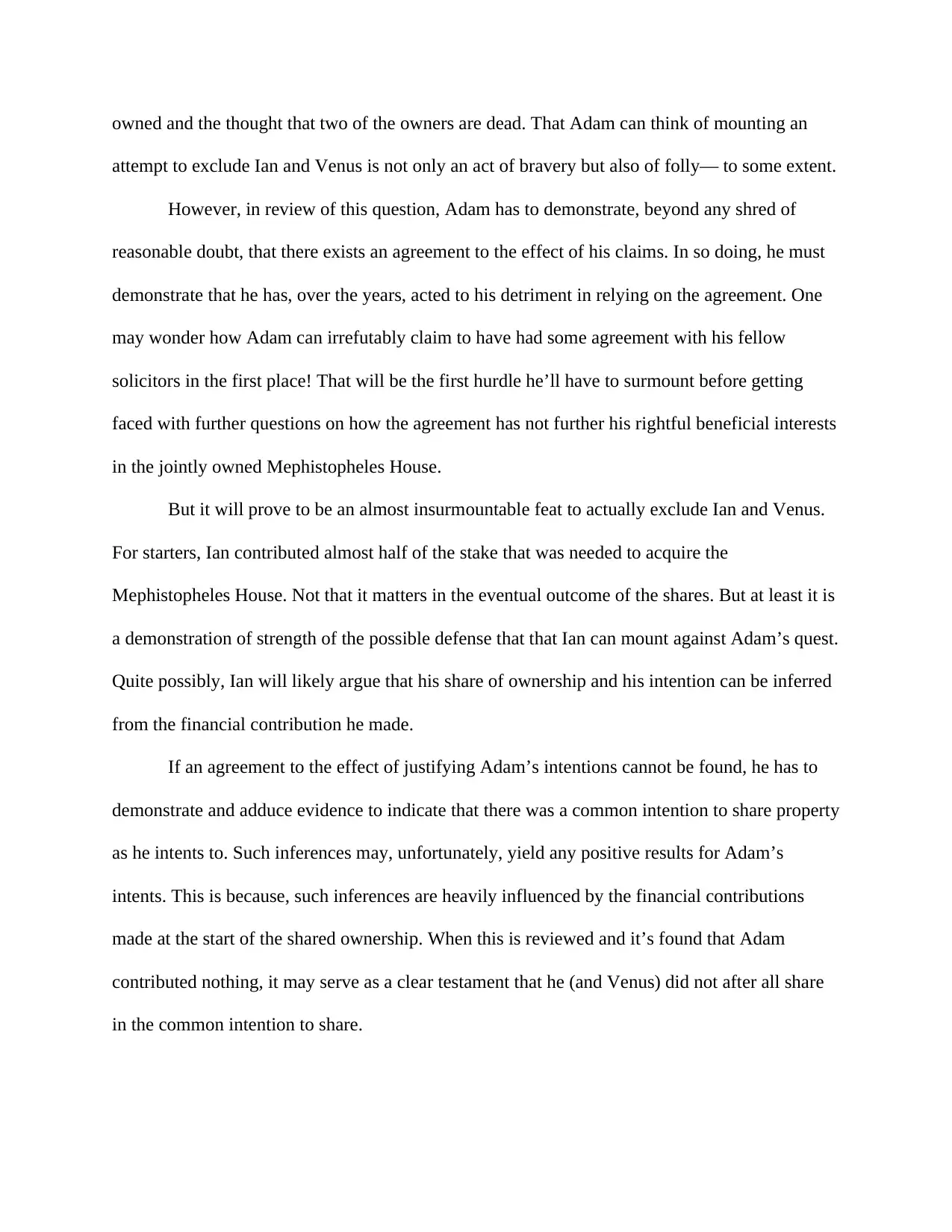
owned and the thought that two of the owners are dead. That Adam can think of mounting an
attempt to exclude Ian and Venus is not only an act of bravery but also of folly— to some extent.
However, in review of this question, Adam has to demonstrate, beyond any shred of
reasonable doubt, that there exists an agreement to the effect of his claims. In so doing, he must
demonstrate that he has, over the years, acted to his detriment in relying on the agreement. One
may wonder how Adam can irrefutably claim to have had some agreement with his fellow
solicitors in the first place! That will be the first hurdle he’ll have to surmount before getting
faced with further questions on how the agreement has not further his rightful beneficial interests
in the jointly owned Mephistopheles House.
But it will prove to be an almost insurmountable feat to actually exclude Ian and Venus.
For starters, Ian contributed almost half of the stake that was needed to acquire the
Mephistopheles House. Not that it matters in the eventual outcome of the shares. But at least it is
a demonstration of strength of the possible defense that that Ian can mount against Adam’s quest.
Quite possibly, Ian will likely argue that his share of ownership and his intention can be inferred
from the financial contribution he made.
If an agreement to the effect of justifying Adam’s intentions cannot be found, he has to
demonstrate and adduce evidence to indicate that there was a common intention to share property
as he intents to. Such inferences may, unfortunately, yield any positive results for Adam’s
intents. This is because, such inferences are heavily influenced by the financial contributions
made at the start of the shared ownership. When this is reviewed and it’s found that Adam
contributed nothing, it may serve as a clear testament that he (and Venus) did not after all share
in the common intention to share.
attempt to exclude Ian and Venus is not only an act of bravery but also of folly— to some extent.
However, in review of this question, Adam has to demonstrate, beyond any shred of
reasonable doubt, that there exists an agreement to the effect of his claims. In so doing, he must
demonstrate that he has, over the years, acted to his detriment in relying on the agreement. One
may wonder how Adam can irrefutably claim to have had some agreement with his fellow
solicitors in the first place! That will be the first hurdle he’ll have to surmount before getting
faced with further questions on how the agreement has not further his rightful beneficial interests
in the jointly owned Mephistopheles House.
But it will prove to be an almost insurmountable feat to actually exclude Ian and Venus.
For starters, Ian contributed almost half of the stake that was needed to acquire the
Mephistopheles House. Not that it matters in the eventual outcome of the shares. But at least it is
a demonstration of strength of the possible defense that that Ian can mount against Adam’s quest.
Quite possibly, Ian will likely argue that his share of ownership and his intention can be inferred
from the financial contribution he made.
If an agreement to the effect of justifying Adam’s intentions cannot be found, he has to
demonstrate and adduce evidence to indicate that there was a common intention to share property
as he intents to. Such inferences may, unfortunately, yield any positive results for Adam’s
intents. This is because, such inferences are heavily influenced by the financial contributions
made at the start of the shared ownership. When this is reviewed and it’s found that Adam
contributed nothing, it may serve as a clear testament that he (and Venus) did not after all share
in the common intention to share.
Secure Best Marks with AI Grader
Need help grading? Try our AI Grader for instant feedback on your assignments.
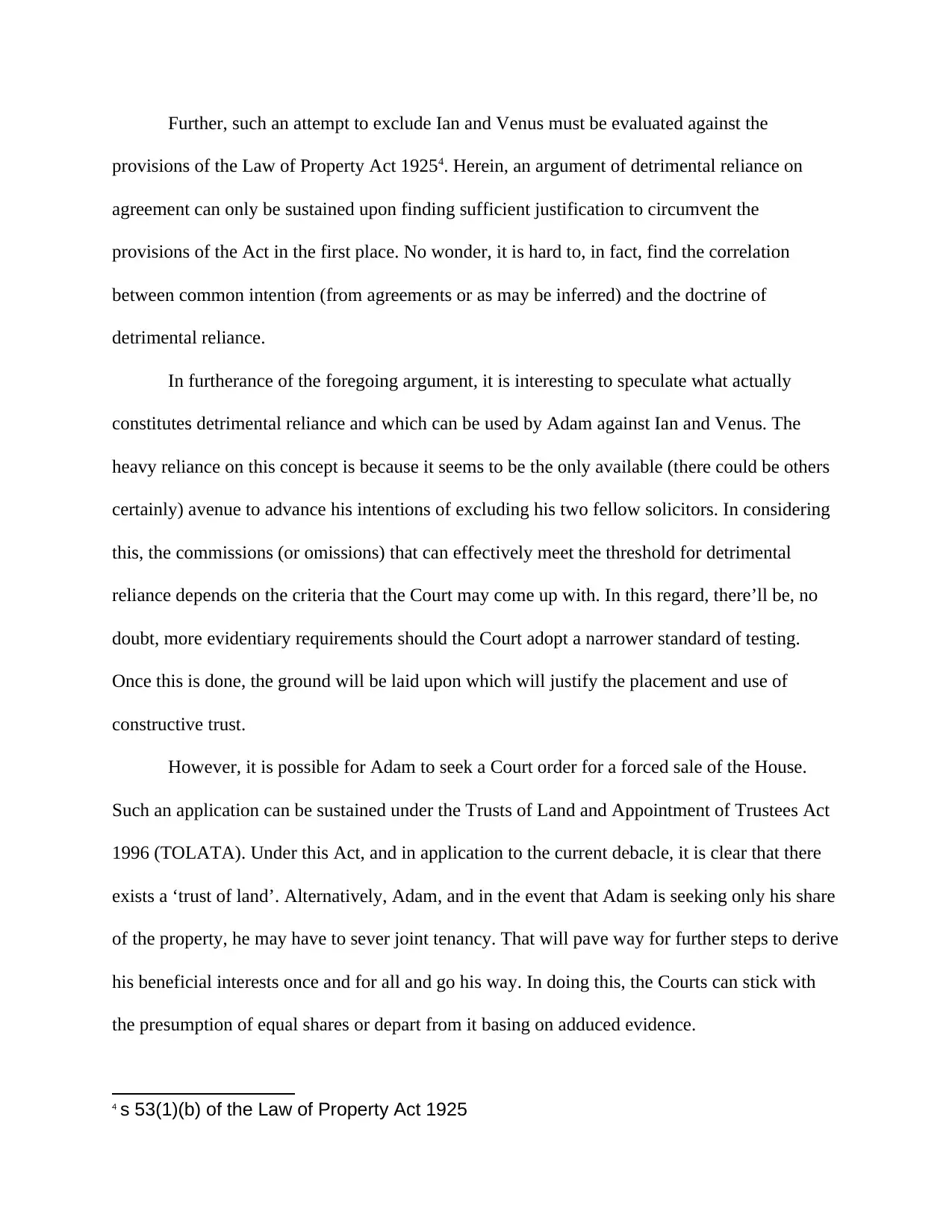
Further, such an attempt to exclude Ian and Venus must be evaluated against the
provisions of the Law of Property Act 19254. Herein, an argument of detrimental reliance on
agreement can only be sustained upon finding sufficient justification to circumvent the
provisions of the Act in the first place. No wonder, it is hard to, in fact, find the correlation
between common intention (from agreements or as may be inferred) and the doctrine of
detrimental reliance.
In furtherance of the foregoing argument, it is interesting to speculate what actually
constitutes detrimental reliance and which can be used by Adam against Ian and Venus. The
heavy reliance on this concept is because it seems to be the only available (there could be others
certainly) avenue to advance his intentions of excluding his two fellow solicitors. In considering
this, the commissions (or omissions) that can effectively meet the threshold for detrimental
reliance depends on the criteria that the Court may come up with. In this regard, there’ll be, no
doubt, more evidentiary requirements should the Court adopt a narrower standard of testing.
Once this is done, the ground will be laid upon which will justify the placement and use of
constructive trust.
However, it is possible for Adam to seek a Court order for a forced sale of the House.
Such an application can be sustained under the Trusts of Land and Appointment of Trustees Act
1996 (TOLATA). Under this Act, and in application to the current debacle, it is clear that there
exists a ‘trust of land’. Alternatively, Adam, and in the event that Adam is seeking only his share
of the property, he may have to sever joint tenancy. That will pave way for further steps to derive
his beneficial interests once and for all and go his way. In doing this, the Courts can stick with
the presumption of equal shares or depart from it basing on adduced evidence.
4 s 53(1)(b) of the Law of Property Act 1925
provisions of the Law of Property Act 19254. Herein, an argument of detrimental reliance on
agreement can only be sustained upon finding sufficient justification to circumvent the
provisions of the Act in the first place. No wonder, it is hard to, in fact, find the correlation
between common intention (from agreements or as may be inferred) and the doctrine of
detrimental reliance.
In furtherance of the foregoing argument, it is interesting to speculate what actually
constitutes detrimental reliance and which can be used by Adam against Ian and Venus. The
heavy reliance on this concept is because it seems to be the only available (there could be others
certainly) avenue to advance his intentions of excluding his two fellow solicitors. In considering
this, the commissions (or omissions) that can effectively meet the threshold for detrimental
reliance depends on the criteria that the Court may come up with. In this regard, there’ll be, no
doubt, more evidentiary requirements should the Court adopt a narrower standard of testing.
Once this is done, the ground will be laid upon which will justify the placement and use of
constructive trust.
However, it is possible for Adam to seek a Court order for a forced sale of the House.
Such an application can be sustained under the Trusts of Land and Appointment of Trustees Act
1996 (TOLATA). Under this Act, and in application to the current debacle, it is clear that there
exists a ‘trust of land’. Alternatively, Adam, and in the event that Adam is seeking only his share
of the property, he may have to sever joint tenancy. That will pave way for further steps to derive
his beneficial interests once and for all and go his way. In doing this, the Courts can stick with
the presumption of equal shares or depart from it basing on adduced evidence.
4 s 53(1)(b) of the Law of Property Act 1925
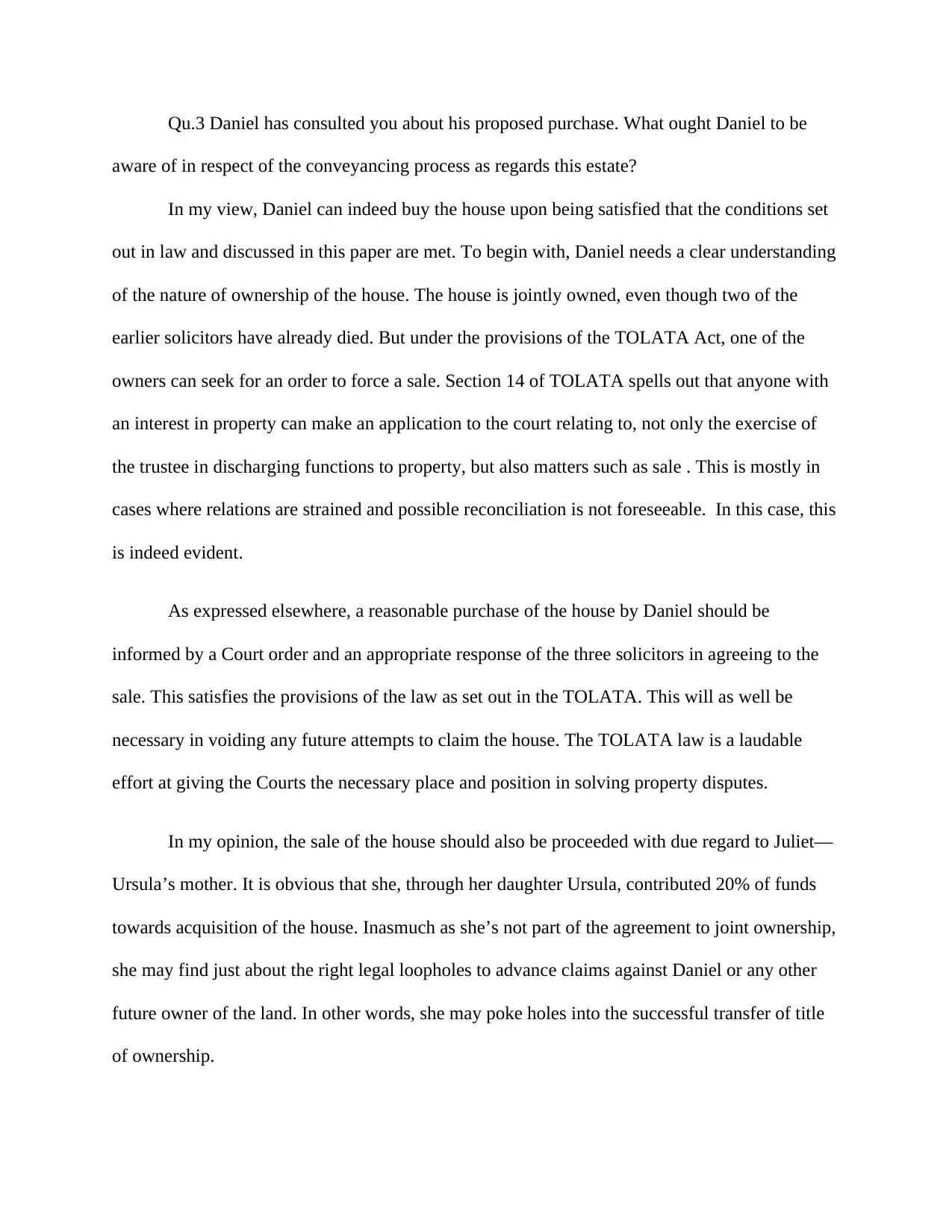
Qu.3 Daniel has consulted you about his proposed purchase. What ought Daniel to be
aware of in respect of the conveyancing process as regards this estate?
In my view, Daniel can indeed buy the house upon being satisfied that the conditions set
out in law and discussed in this paper are met. To begin with, Daniel needs a clear understanding
of the nature of ownership of the house. The house is jointly owned, even though two of the
earlier solicitors have already died. But under the provisions of the TOLATA Act, one of the
owners can seek for an order to force a sale. Section 14 of TOLATA spells out that anyone with
an interest in property can make an application to the court relating to, not only the exercise of
the trustee in discharging functions to property, but also matters such as sale . This is mostly in
cases where relations are strained and possible reconciliation is not foreseeable. In this case, this
is indeed evident.
As expressed elsewhere, a reasonable purchase of the house by Daniel should be
informed by a Court order and an appropriate response of the three solicitors in agreeing to the
sale. This satisfies the provisions of the law as set out in the TOLATA. This will as well be
necessary in voiding any future attempts to claim the house. The TOLATA law is a laudable
effort at giving the Courts the necessary place and position in solving property disputes.
In my opinion, the sale of the house should also be proceeded with due regard to Juliet—
Ursula’s mother. It is obvious that she, through her daughter Ursula, contributed 20% of funds
towards acquisition of the house. Inasmuch as she’s not part of the agreement to joint ownership,
she may find just about the right legal loopholes to advance claims against Daniel or any other
future owner of the land. In other words, she may poke holes into the successful transfer of title
of ownership.
aware of in respect of the conveyancing process as regards this estate?
In my view, Daniel can indeed buy the house upon being satisfied that the conditions set
out in law and discussed in this paper are met. To begin with, Daniel needs a clear understanding
of the nature of ownership of the house. The house is jointly owned, even though two of the
earlier solicitors have already died. But under the provisions of the TOLATA Act, one of the
owners can seek for an order to force a sale. Section 14 of TOLATA spells out that anyone with
an interest in property can make an application to the court relating to, not only the exercise of
the trustee in discharging functions to property, but also matters such as sale . This is mostly in
cases where relations are strained and possible reconciliation is not foreseeable. In this case, this
is indeed evident.
As expressed elsewhere, a reasonable purchase of the house by Daniel should be
informed by a Court order and an appropriate response of the three solicitors in agreeing to the
sale. This satisfies the provisions of the law as set out in the TOLATA. This will as well be
necessary in voiding any future attempts to claim the house. The TOLATA law is a laudable
effort at giving the Courts the necessary place and position in solving property disputes.
In my opinion, the sale of the house should also be proceeded with due regard to Juliet—
Ursula’s mother. It is obvious that she, through her daughter Ursula, contributed 20% of funds
towards acquisition of the house. Inasmuch as she’s not part of the agreement to joint ownership,
she may find just about the right legal loopholes to advance claims against Daniel or any other
future owner of the land. In other words, she may poke holes into the successful transfer of title
of ownership.
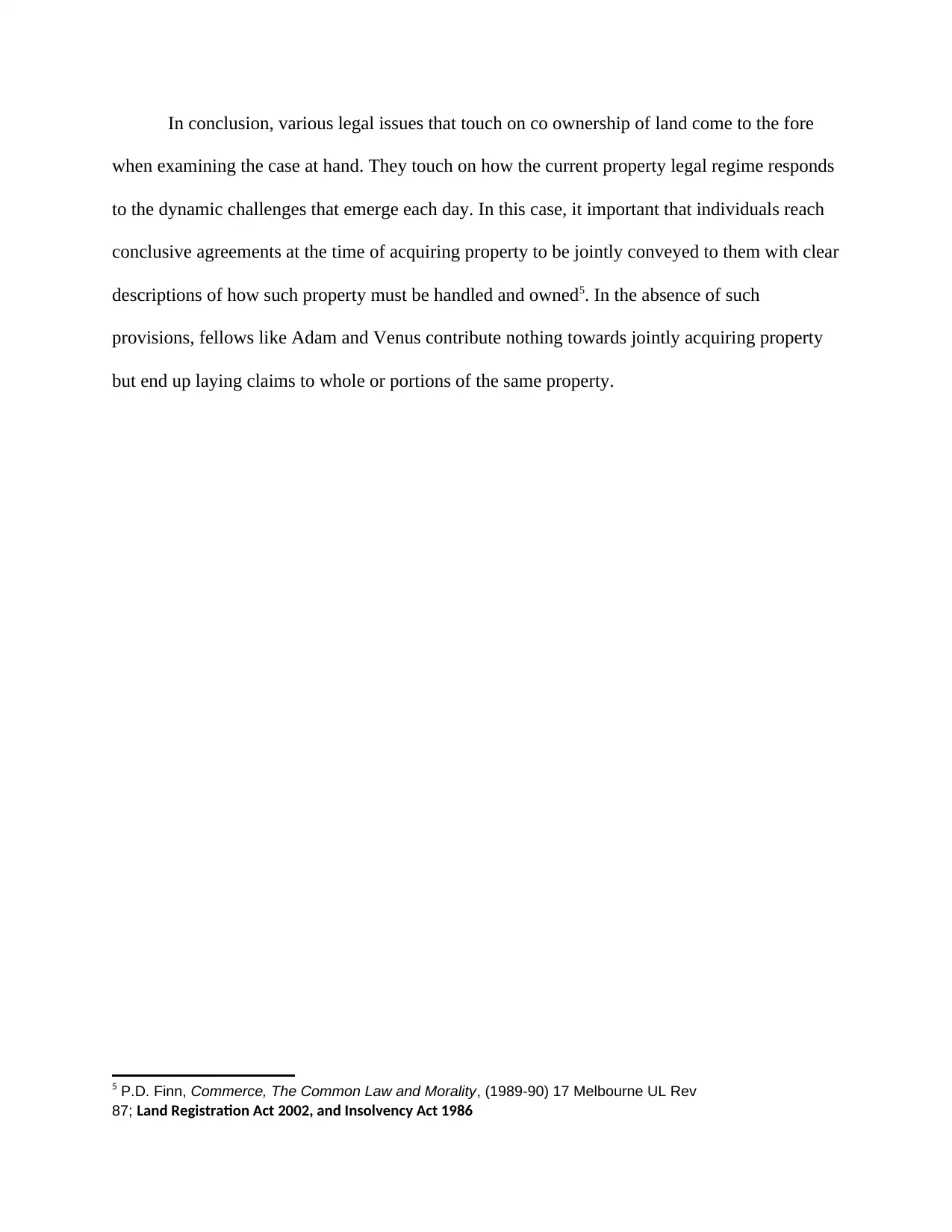
In conclusion, various legal issues that touch on co ownership of land come to the fore
when examining the case at hand. They touch on how the current property legal regime responds
to the dynamic challenges that emerge each day. In this case, it important that individuals reach
conclusive agreements at the time of acquiring property to be jointly conveyed to them with clear
descriptions of how such property must be handled and owned5. In the absence of such
provisions, fellows like Adam and Venus contribute nothing towards jointly acquiring property
but end up laying claims to whole or portions of the same property.
5 P.D. Finn, Commerce, The Common Law and Morality, (1989-90) 17 Melbourne UL Rev
87; Land Registration Act 2002, and Insolvency Act 1986
when examining the case at hand. They touch on how the current property legal regime responds
to the dynamic challenges that emerge each day. In this case, it important that individuals reach
conclusive agreements at the time of acquiring property to be jointly conveyed to them with clear
descriptions of how such property must be handled and owned5. In the absence of such
provisions, fellows like Adam and Venus contribute nothing towards jointly acquiring property
but end up laying claims to whole or portions of the same property.
5 P.D. Finn, Commerce, The Common Law and Morality, (1989-90) 17 Melbourne UL Rev
87; Land Registration Act 2002, and Insolvency Act 1986
Paraphrase This Document
Need a fresh take? Get an instant paraphrase of this document with our AI Paraphraser
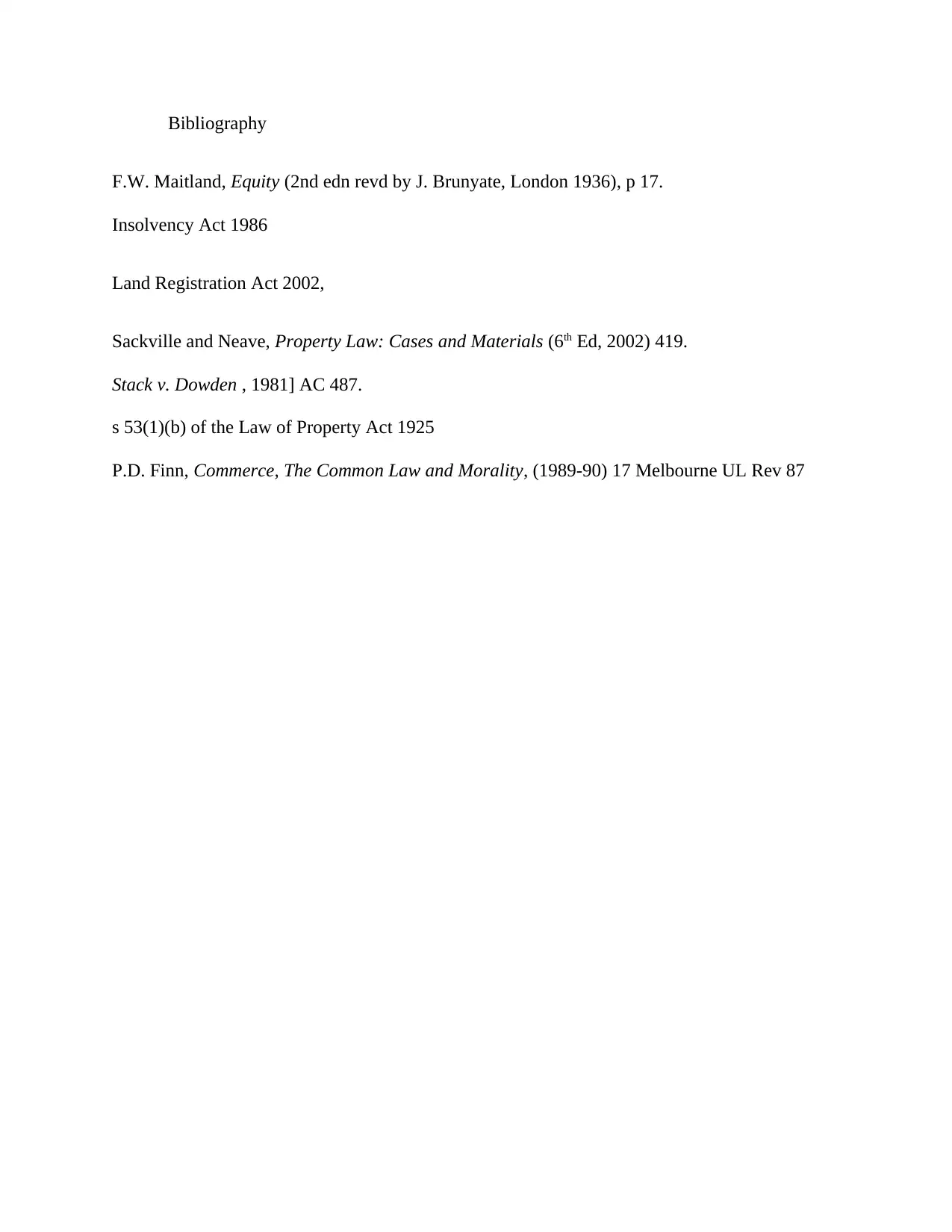
Bibliography
F.W. Maitland, Equity (2nd edn revd by J. Brunyate, London 1936), p 17.
Insolvency Act 1986
Land Registration Act 2002,
Sackville and Neave, Property Law: Cases and Materials (6th Ed, 2002) 419.
Stack v. Dowden , 1981] AC 487.
s 53(1)(b) of the Law of Property Act 1925
P.D. Finn, Commerce, The Common Law and Morality, (1989-90) 17 Melbourne UL Rev 87
F.W. Maitland, Equity (2nd edn revd by J. Brunyate, London 1936), p 17.
Insolvency Act 1986
Land Registration Act 2002,
Sackville and Neave, Property Law: Cases and Materials (6th Ed, 2002) 419.
Stack v. Dowden , 1981] AC 487.
s 53(1)(b) of the Law of Property Act 1925
P.D. Finn, Commerce, The Common Law and Morality, (1989-90) 17 Melbourne UL Rev 87
1 out of 8
Your All-in-One AI-Powered Toolkit for Academic Success.
+13062052269
info@desklib.com
Available 24*7 on WhatsApp / Email
![[object Object]](/_next/static/media/star-bottom.7253800d.svg)
Unlock your academic potential
© 2024 | Zucol Services PVT LTD | All rights reserved.

